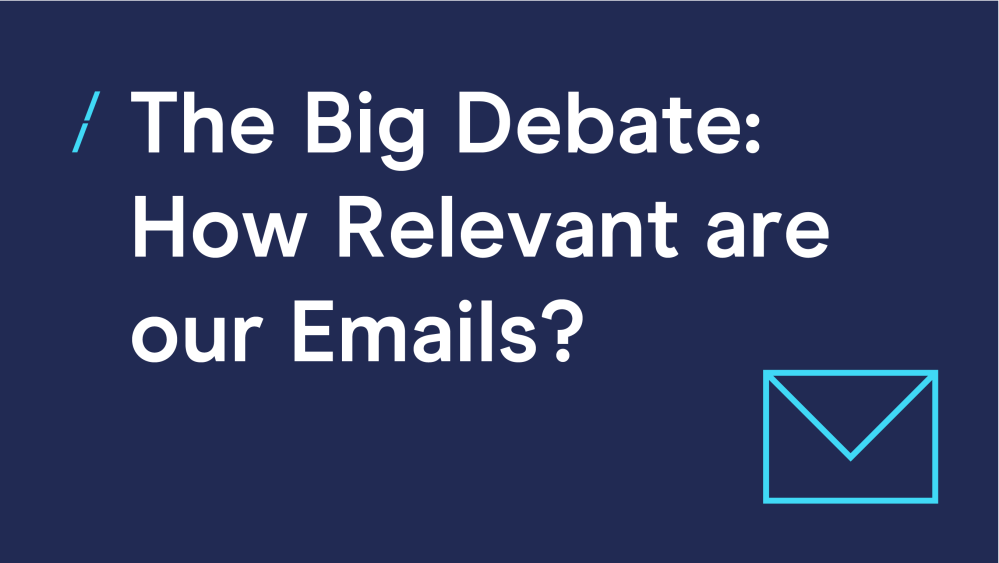Notes from the Big Debate
30 Jul 2019

The Charge
The prosecution charged marketers with sending too many irrelevant emails, claiming that the resulting barrage of communications also lacked consideration of the creative opportunities email has as a channel.
Prosecution
Louise Baker, UK Digital Marketing Strategist, Unicef
Suzanna Chaplin, Managing Director, esbconnect
Defence
Mark Ash, CEO, Pure360
Dhiren Patel, Digital Marketing Manager, The Economist
The Trial
Expert guest speakers from email, agency, brand, and research backgrounds tackled this divisive topic in the latest Big Debate.
Chaired by Steve Kemish, Tutor, IDM, and Managing Partner, Junction Marketing, it didn’t take long for our panellists to get fired up about the issue at hand.
The prosecution began their case by talking about data.
Marketers have more data than they know what to do with – and they don’t use it as efficiently as they could.
Instead, they use assumptions surrounding age and activity rather than making data work harder.
For example, Louise Baker, UK Digital Marketing Strategist, Unicef, receives frequent email marketing for baby clothes, despite being single and having no previous activity around babies or their various needs.
This is lazy marketing.
And can cause bigger marketing problems down the road. Consumers often find the pile of irrelevant emails extremely annoying and that can damage the relationship you’ve built with the customer.
It creates churn – and all of your hard-earned customer engagement goes out the window and into the bin – along with those ill-advised emails.
It was suggested that the lack of innovation and creativity results from the ease of building and sending emails and the relatively low cost associated with the channel.
That it’s quantity over quality when it comes to email campaigns.
And then, the defence took the stage.
They suggested that email is being attacked by newer, flashier technologies with big budgets, while email is a cheap, convenient, and accessible channel – and its accessibility is what makes it great.
You shouldn’t have to pay giants like Facebook and Google in order to reach your customer.
Email allows for freedom of speech and gives everyone a platform to speak from. Even if some take it lightly.
They addressed creativity, reasoning that this is not a channel-specific issue, but a marketing issue: any channel can be misused by an ill-informed marketer.
People were toeing the line between guilty and innocent.
And an expert witness, Tim Bond, Head of Insight and PR, DMA, was called to the stand.
An Expert Opinion
The prosecution asked about the effect of a large volume of emails on open rates, as there are many marketers who believe the more emails automatically lead to more sales.
Tim stated that open rates can depend on many different factors, and suggested that open rates may not even be the most useful metric because of this issue.
Interestingly, 50% of marketers actually think that half of the emails they send to customers are irrelevant. However, this is with the caveat that relevance depends on the specific circumstances that specific email is received in.
The number one reason that consumers unsubscribe is too many emails, with the second reason being that the emails are no longer relevant.
The defence questioned Tim about the impact of GDPR, finding that 56% of marketers feel positive about the changes it has brought.
Consumers also have more confidence in brands, with 41% saying that the new laws have made them more comfortable about how brands treat their data.
But the final nail in the coffin was Tim’s opinion on the overall accusation.
When asked if he believed there were too many irrelevant marketing emails, Tim’s response was a resounding ‘yes’.
He caveated this by pointing out that this isn’t’ really a consumer concern in the way that marketers make it out to be, but is, instead, something that consumers expect and filter through automatically.
Closing Statements
The prosecution summed up by saying that brands are spamming their contacts with too many irrelevant emails (Louise received eight emails from the same brand within a small time period, and has done for a number of years.)
The defence summed up by saying that creativity in emails does exist – we just have to keep our eyes open for them. For example, the 2018 DMA Award for Best Use of Email went to Armadillo and McDonald's for their clever and creative use of the channel.
Overall, the creativity or lack thereof in email shouldn't be attacked as a whole; it is those marketers who are choosing quantity over quality that are giving email a bad name, rather than there being an inherent flaw with the channel.
The Final Verdict
Email was found guilty on both counts by a jury of its peers – who were undoubtedly biased spam email recipients.
There is Hope
Remember, it is possible to create great marketing. It exists. But not everyone practices what they preach.
Emails could be much more effective if data was used better and more intelligently.
An email address allows the marketer to reach out to a single individual, which offers a world of opportunity.
If you’re doing it well, your marketing will stand out from the crowd.
This event was sponsored by

Please login to comment.
Comments